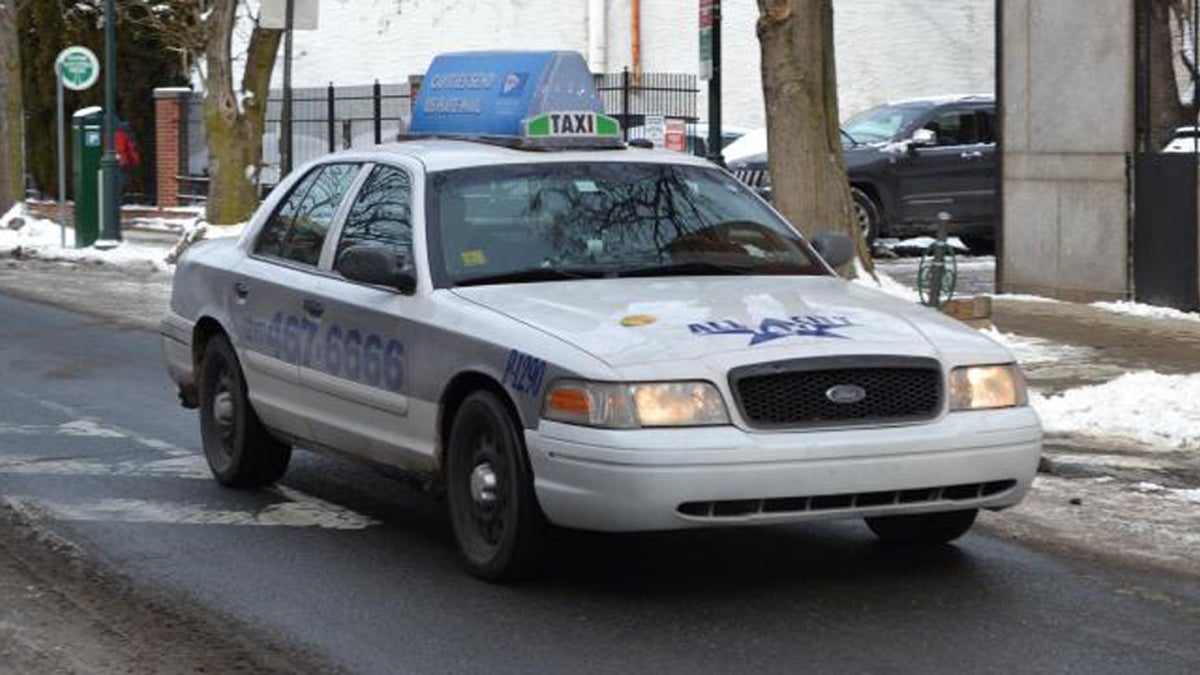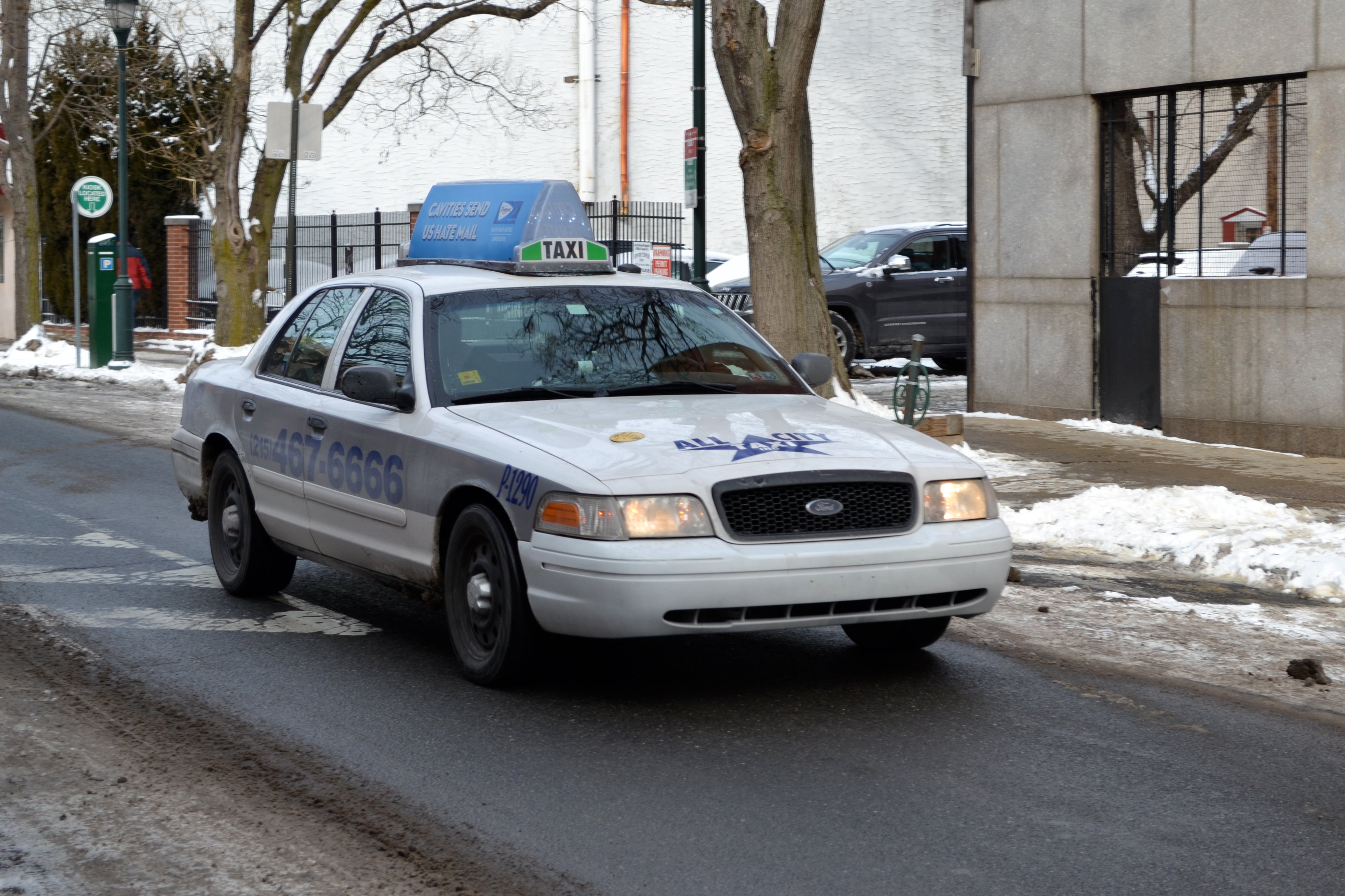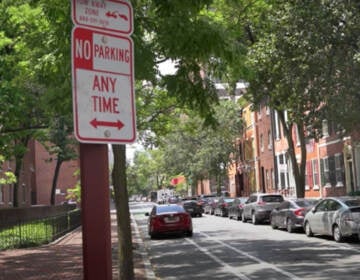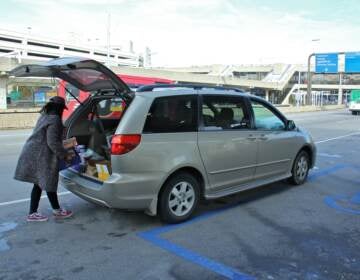City council questions lack of wheelchair accessible cabs

(PlanPhilly Image)
The Philadelphia Parking Authority plans to begin issuing 45 medallions for new, wheelchair accessible cabs this summer.
Last week, a group of City Council members came together to discuss the state of Philadelphia’s cabs.
Councilman David Oh led the discussion, asking if newer cabs, cabs with alternative fuel sources or bike racks, or wheelchair accessible cabs could be a “win, win for everyone in the city.” The discussion quickly turned to the fact that Philadelphia, a city of 1.5 million people, only has seven wheelchair accessible cabs.
The Philadelphia Parking Authority plans to begin issuing 45 medallions for new, wheelchair accessible cabs this summer. After that, PPA will issue an additional 15 wheelchair accessible cab medallions per year, for seven years. The new medallions are made possible by legislation passed in 2012 that allows PPA to issue up to 150 wheelchair accessible cab medallions over 10 years.
Today Philadelphia has 1,600 cabs, and of those, only seven are wheelchair accessible. In New York City, Manhattan has 12,000 cabs for 1.6 million people. Of those, 233 are wheelchair accessible. Boston, a city with a smaller population than Philadelphia (636,000 people), has 200 more cabs than Philadelphia. Boston’s fleet of 1,800 cabs has 100 wheelchair accessible cabs.
After PPA issues the first 45 new medallions, the authority will evaluate if there is demand for additional wheelchair accessible cabs. If the demand exists, PPA will issue an additional 15 cabs per year.
When asked if PPA would continue issuing wheelchair accessible medallions after the ten year legislation expires, Jim Nye, PPA taxi and limousine director, said. “Beyond that I don’t know. Unless there is a great deal of support and need, it’s 150 [medallions] over the next 10 years.”
Councilman Dennis O’Brien asked that if PPA is not going to issue medallions again for the foreseeable future, shouldn’t PPA fight to add even more wheelchair accessible cabs now?
“Seven [wheelchair accessible] cabs out of 1,600 is just not acceptable,” O’Brien said. “Not acceptable!”
PPA Executive Director Vince Fenerty said if PPA needs to release more wheelchair accessible cab medallions, PPA will have to go back to the state legislature for approval.
“Unfortunately those who have spent time in the legislature … know the process to get regulations done is the largest bureaucratic nightmare that exists, I believe, in America, and this process was extremely slow,” he said. “There’s a lot of input from the industry. There are financial impact studies.”
That slow, laborious process is where City Council’s support might be needed most.
When Councilman Oh asked if there is anything City Council can do to support PPA in efforts to add wheelchair accessible cab medallions, Nye said, “Since City Council does not actually regulate any aspect of what we do in terms of regulating taxicab and limousine service, what we would count on you for is support in our regulatory efforts.”
CAB COMPLEXITIES
The taxicab industry in Philadelphia is more complex than it may appear at first glance, said Jim Nye.
One of the first complexities is linked to medallions, essentially permits to operate cabs in the city. For years, state statute has capped the number of medallions in Philadelphia at 1,600. Medallions can be owned by corporations or individuals and are transferred between buyer and seller. Many cab drivers lease medallions per shift, day or week.
In 2005, the average medallion sold for approximately $60,000, Nye said. Today they sell for more than $500,000. Revenue generated by the sale of medallions is directed to a fund controlled by the Pennsylvania State Treasury, not by the PPA.
“The increase in medallion costs has not been used to improve taxi cab service, yet,” Nye said.
“Unfortunately most medallion owners continue to use the worst vehicles that could possibly be in service,” he said. “In many cases the vehicles used by medallion owners cost $5,000, $6,000 or less.”
Any current medallion owner is free to convert a medallion cab into a wheelchair accessible cab, but purchasing or retrofitting a wheelchair accessible cab is not free.
“The cost is significantly higher than what medallion owners are putting in service now,” Nye said. “As I mentioned, it’s about $5,000 per vehicle. You’re looking at probably $25,000 for a wheelchair accessible vehicle to be outfitted.”
Insurance is another issue.
“I think with additional vehicles and newer vehicles, the whole insurance scheme for taxi cabs in Philadelphia is going to have to change because if they’re going to be new vehicles, they’re going to require collision coverage…” Nye said. “Right now such vehicles don’t exist in the taxi fleet, so it’s going to require some changes.”
Click through for more articles on PlanPhilly.
WHYY is your source for fact-based, in-depth journalism and information. As a nonprofit organization, we rely on financial support from readers like you. Please give today.
City council questions lack of wheelchair accessible cabs

Last week, a group of City Council members came together to discuss the state of Philadelphia’s cabs.
Councilman David Oh led the discussion, asking if newer cabs, cabs with alternative fuel sources or bike racks, or wheelchair accessible cabs could be a “win, win for everyone in the city.” The discussion quickly turned to the fact that Philadelphia, a city of 1.5 million people, only has seven wheelchair accessible cabs.
The Philadelphia Parking Authority plans to begin issuing 45 medallions for new, wheelchair accessible cabs this summer. After that, PPA will issue an additional 15 wheelchair accessible cab medallions per year, for seven years. The new medallions are made possible by legislation passed in 2012 that allows PPA to issue up to 150 wheelchair accessible cab medallions over 10 years.
Today Philadelphia has 1,600 cabs, and of those, only seven are wheelchair accessible. In New York City, Manhattan has 12,000 cabs for 1.6 million people. Of those, 233 are wheelchair accessible. Boston, a city with a smaller population than Philadelphia (636,000 people), has 200 more cabs than Philadelphia. Boston’s fleet of 1,800 cabs has 100 wheelchair accessible cabs.
After PPA issues the first 45 new medallions, the authority will evaluate if there is demand for additional wheelchair accessible cabs. If the demand exists, PPA will issue an additional 15 cabs per year.
When asked if PPA would continue issuing wheelchair accessible medallions after the ten year legislation expires, Jim Nye, PPA taxi and limousine director, said. “Beyond that I don’t know. Unless there is a great deal of support and need, it’s 150 [medallions] over the next 10 years.”
Councilman Dennis O’Brien asked that if PPA is not going to issue medallions again for the foreseeable future, shouldn’t PPA fight to add even more wheelchair accessible cabs now?
“Seven [wheelchair accessible] cabs out of 1,600 is just not acceptable,” O’Brien said. “Not acceptable!”
PPA Executive Director Vince Fenerty said if PPA needs to release more wheelchair accessible cab medallions, PPA will have to go back to the state legislature for approval.
“Unfortunately those who have spent time in the legislature … know the process to get regulations done is the largest bureaucratic nightmare that exists, I believe, in America, and this process was extremely slow,” he said. “There’s a lot of input from the industry. There are financial impact studies.”
That slow, laborious process is where City Council’s support might be needed most.
When Councilman Oh asked if there is anything City Council can do to support PPA in efforts to add wheelchair accessible cab medallions, Nye said, “Since City Council does not actually regulate any aspect of what we do in terms of regulating taxicab and limousine service, what we would count on you for is support in our regulatory efforts.”
CAB COMPLEXITIES
The taxicab industry in Philadelphia is more complex than it may appear at first glance, said Jim Nye.
One of the first complexities is linked to medallions, essentially permits to operate cabs in the city. For years, state statute has capped the number of medallions in Philadelphia at 1,600. Medallions can be owned by corporations or individuals and are transferred between buyer and seller. Many cab drivers lease medallions per shift, day or week.
In 2005, the average medallion sold for approximately $60,000, Nye said. Today they sell for more than $500,000. Revenue generated by the sale of medallions is directed to a fund controlled by the Pennsylvania State Treasury, not by the PPA.
“The increase in medallion costs has not been used to improve taxi cab service, yet,” Nye said.
“Unfortunately most medallion owners continue to use the worst vehicles that could possibly be in service,” he said. “In many cases the vehicles used by medallion owners cost $5,000, $6,000 or less.”
Any current medallion owner is free to convert a medallion cab into a wheelchair accessible cab, but purchasing or retrofitting a wheelchair accessible cab is not free.
“The cost is significantly higher than what medallion owners are putting in service now,” Nye said. “As I mentioned, it’s about $5,000 per vehicle. You’re looking at probably $25,000 for a wheelchair accessible vehicle to be outfitted.”
Insurance is another issue.
“I think with additional vehicles and newer vehicles, the whole insurance scheme for taxi cabs in Philadelphia is going to have to change because if they’re going to be new vehicles, they’re going to require collision coverage…” Nye said. “Right now such vehicles don’t exist in the taxi fleet, so it’s going to require some changes.”
WHYY is your source for fact-based, in-depth journalism and information. As a nonprofit organization, we rely on financial support from readers like you. Please give today.




